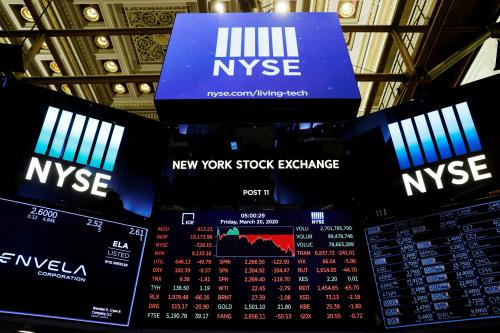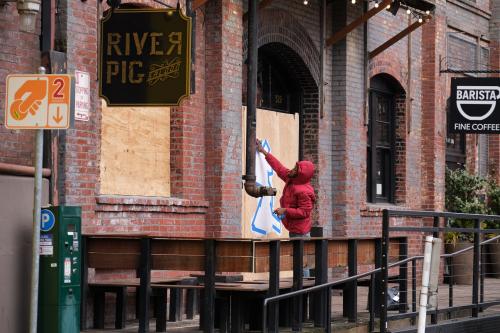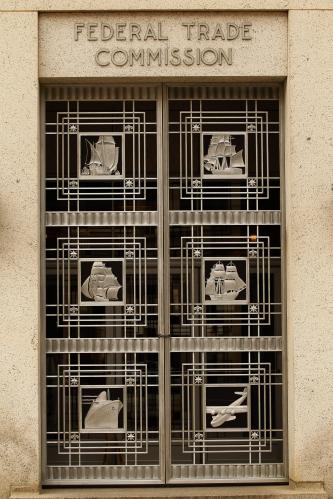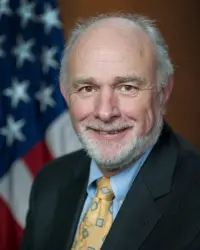Bill Baer served as Assistant Attorney General in charge of the Antitrust Division of the U.S. Department of Justice from 2013 to 2016, and as Director of the Bureau of Competition at the Federal Trade Commission from 1995 to 1999.
Antitrust enforcers need to be vigilant in these uncertain and troubling times. Think about the effect on consumers from price gouging, price fixing, mergers in concentrated markets and the unilateral exercise of monopoly power. We rely on vigorous rivalry between firms—in good times and bad—to deliver us quality goods and services at competitive prices. The American consumer remains entitled to the benefits of competition, especially during a major health and economic crisis. It is up to federal and state enforcers to serve as the economic cops on the beat as we begin the long road to recovery.
What needs to be done? In the short term, the Department of Justice and the Federal Trade Commission need to facilitate legitimate cooperation among manufacturers, distributors, and retailers to ensure critical goods and services—think masks and respirators—get to market in a timely fashion. To their credit, the two agencies are trying to do just that. In late March the two agencies jointly announced an expedited process for reviewing and green lighting collaborations of businesses working to protect the health and safety of Americans during the COVID-19 pandemic. And true to their word, 10 days later DOJ formally advised certain medical supplies distributors that it would not stand in the way of a joint effort to work with FEMA and expedite sourcing, production and delivery of personal protective equipment.
But getting out of the way at the right time is just one priority. Antitrust enforcers must be vigilant in attacking efforts by firms to limit competition in a time of crisis. And the temptation will be there. Those of us involved over the years in investigating and prosecuting price fixing and bid rigging know well that the urge to cartelize markets is strongest in the face of falling prices triggered by reduced demand. Although it is often rationalized during tough economic times as “not raising prices, just stabilizing them,” or “just protecting our margins, not increasing them,” agreements between companies that restrict competition are per se unlawful and subject the companies and their executives to criminal prosecution. Consumers deserve the benefit of market competition regardless of where we are in the economic cycle.
The temptation to cheat is not limited to traditional brick and mortar commerce. While at DOJ in the Obama Administration we uncovered a scheme involving two online sellers of poster art on Amazon Marketplace. After experiencing shrinking margins due to price competition, executives of the two companies got together and wrote an algorithm that priced their online offerings identically when consumers searched for poster art. The result was corporate and individual criminal charges.
Antitrust enforcers will need to vigilantly police mergers and acquisitions as the economy struggles to regain its footing. Our sudden but necessary shutdown has put business of all sizes at risk of permanent closure. Economists see small businesses as particularly vulnerable, and the CARES Act only begins to address the problem. Policy makers must continue to provide financial support and other incentives to keep small and medium-sized businesses afloat. But realistically, not all businesses are going to be able to get up and running again. That means many markets are going to become more concentrated. We will see it in all sectors, from agriculture and retail to manufacturing and travel. Fewer competitors means less competition, more market power for some sellers and some buyers, and more risk of tacit price coordination. At the end of the day consumers will pay more.
And competitors will want to combine. We have seen this before as the U.S. and world economies struggled to get back on track from prior recessions. Firms will see horizontal and some vertical mergers as the quickest way to raise shareholder value. That is where tough merger enforcement will be critical, because shareholder value should not be given priority at the expense of the American consumer. It is easy to imagine scenarios where airlines or cruise ship companies, supermarket and drugstore chains, agricultural producers and processors, and wireless providers will argue that the weakness of one or more firms in those sectors requires consolidation and quick merger approval. In unconcentrated markets, that may be the right outcome, but in markets with just a handful of players, that is likely to be the wrong move for the American consumer, with long-term adverse consequences on innovation, quality, and price.
There is an exception in antitrust law allowing a competitor to acquire a “failing firm” in limited circumstances. The would-be buyer must show that it is effectively the only company willing to pay any meaningful value for the distressed firm. That is rarely the case. A competitor in a concentrated market may well be willing to pay the most for the firm. But if this is a “market power premium” premised on the belief that the buyer will be able raise prices to consumers and recoup its acquisition costs at our expense, the merger should not be allowed.
We face an uncertain path to economic recovery in the days, months, and years ahead. The public policy choices we make today and tomorrow will live with us for a long time. We need to make sure the steps we take to get back to normal do not irreversibly alter markets and deprive consumers of competition in the long run. Our antitrust enforcers—the economic cops on the beat—have a big job to do.







Commentary
Why we need antitrust enforcement during the COVID-19 pandemic
April 22, 2020